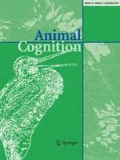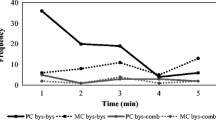Abstract.
Reconciliation in primates, a post-conflict affiliative interaction between former opponents, appears to have two functions: (1) to repair relationship damaged by aggression such that animals who share more valuable relationships are more likely to reconcile, and (2) to reduce the post-conflict uncertainty and stress of former combatants. The ’integrated hypothesis’ of reconciliation links these functions by arguing that the disturbance of a valuable relationship by aggression should result in particularly high levels of stress, which in turn should facilitate efforts to reconcile and thus gain relief from post-conflict stress. A key prediction of the integrated hypothesis is that victims of aggression suffer more stress following conflicts with individuals with whom they share a valuable relationship. In this article, we test the integrated hypothesis by observing the post-conflict behaviour of victims among a free-ranging provisioned troop of Japanese macaques (Macaca fuscata fuscata) living in Shiga Heights, Nagano, Japan. In this troop, monkeys reconciled roughly one in seven conflicts. The only factor that we could significantly relate to the occurrence of reconciliation was kinship; kin reconciled more frequently than non-kin did. Receiving aggression increased and reconciliation reduced the probability of being re-attacked after aggressive interactions, supporting the hypothesis that reconciliation repairs relationships. Victims’ self-directed behaviour (SDB) — a behavioural index of stress comprising increases in scratching, self-grooming, and body-shaking — was elevated following aggression but decreased rapidly following reconciliation, supporting the idea that reconciliation functions to reduce post-conflict stress. Post-conflict SDB varied as follows: (1) victims showed a higher level of stress following aggression with kin than with non-kin, and (2) juvenile victims were less distressed than adults. The level of post-conflict SDB performed by juveniles following conflicts with kin was indistinguishable from that performed by adults but was greatly reduced following attacks from non-kin. These results indicate that post-conflict SDB keenly reflects the value of relationships between opponents, and that the post-conflict behaviour of free-ranging Japanese macaques fits the predictions of the integrated hypothesis.
Similar content being viewed by others
Author information
Authors and Affiliations
Additional information
Accepted after revision: 11 September 2001
Electronic Publication
Rights and permissions
About this article
Cite this article
Kutsukake, N., Castles, D.L. Reconciliation and variation in post-conflict stress in Japanese macaques (Macaca fuscata fuscata): testing the integrated hypothesis. Anim.Cogn. 4, 259–268 (2001). https://doi.org/10.1007/s10071-001-0119-2
Received:
Published:
Issue Date:
DOI: https://doi.org/10.1007/s10071-001-0119-2




